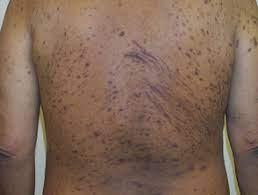Definition
Uremic pruritus is an itchy skin condition that occurs in patients with end-stage renal failure who are on dialysis. The condition is associated with a lower quality of life as well as mortality in patients with end-stage renal failure.
Uremic refers to the condition of an excessive amount of urea (a byproduct of protein metabolism) in the blood, which occurs when the kidneys stop working, also known as renal failure. Pruritus is defined as itching on the skin.
This disease has an incidence rate of about 1 in every 3 dialysis patients. Uremic pruritus affects 20-50% of patients with chronic renal failure. However, the reported rate is lower in children, at around 9%.
Uremic pruritus is not associated with gender, age, race, dialysis duration, or cause of renal failure.
Causes
Uremic pruritus is thought to be caused by a combination of factors, including dry skin, decreased sweating, abnormal calcium and phosphate metabolism, increased parathyroid hormone, abnormal magnesium and aluminum concentrations, toxin accumulation, systemic inflammation (inflammation of the whole body), an underlying disease, particularly diabetes and liver disease, or inadequate dialysis.
Risk factor
Several risk factors increase the likelihood of developing uremic pruritus, including people with diabetes mellitus who have chronic kidney disease, those who do not receive regular dialysis, and diabetic patients with poor blood sugar control are all at risk to develop uremic pruritus.
Symptoms
Itching in uremic pruritus most commonly appears in the back area. However, uremic pruritus can cause itching in other areas, including the hands, head, and abdomen. Generalized pruritus, or itching that spreads throughout the body, can occur in 20-50% of patients.
Some of the characteristics commonly found in uremic pruritus are itching that worsens, especially at night, making it difficult for patients to sleep and causing sleep disturbances; itching that worsens when exposed to hot temperatures and stress triggers; itching that tends to decrease when engaging in physical activity, being in cold temperatures, and taking cold or lukewarm showers; and itching symptoms that fluctuate during the dialysis process.
Several skin signs can be associated with uremic pruritus from repeated scratching, such as excoriation (signs of repeated scratching), dry skin, and other skin diseases such as chronic lichen simplex (obvious skin relief and thickening of the skin in the itchy area), and prurigo nodularis (black pustules caused by repeated and chronic scratching).
Diagnosis
Uremic pruritus is a clinical diagnosis that can typically be determined through a medical interview and physical examination.
During the medical interview, the doctor will inquire about your history of chronic kidney disease and when your symptoms began. During the physical examination, the doctor will examine the area of your complaint to diagnose the disease.
Supporting examinations also play a role in establishing or confirming the diagnosis of uremic pruritus, including laboratory tests such as blood urea nitrogen (BUN), parathyroid hormone, phosphate, calcium, and magnesium levels.
Uremic pruritus is also associated with the onset of pruritus in dialysis patients, persistent symptoms, and known elevated blood urea levels.
However, several skin diseases and metabolic causes of itching must be ruled out, including eczema, scabies, drug reactions, iron deficiency, and thyroid disease.
Management
The first and most important treatment is to optimize dialysis. This is necessary to reduce blood parathyroid hormone levels and thus restore calcium and phosphate balance. This is also used as a foundation to reduce the source of itching in uremic pruritus.
Furthermore, some treatments and therapies that can be performed include using non-soap cleansers and applying moisturizers immediately after rinsing with moisturizing components such as emollients, specifically glycerol and petrolatum, several times per day.
Avoid scratching your nails and keep them short and clean. Avoid itch-causing factors such as heat and stress.
Ointments that can be used to relieve itching symptoms in specific areas include menthol cream, which is a cream that provides a cold sensation and thus acts as an itch reliever. Additionally, capsaicin cream can be applied to the itchy area.
Complications
Complications of uremic pruritus are typically caused by scratching, which can result in skin infections (impetigo), skin pustules (prurigo), or chronic lichen simplex. Furthermore, uremic pruritus causes patients to have a lower quality of life and discomfort from itching, which can lead to anxiety and depression. Uremic pruritus in dialysis patients is associated with an increase in mortality of approximately 17%.
Prevention
To prevent uremic pruritus, you can take the following steps:
- Perform regular dialysis for patients with end-stage renal failure
- Control blood sugar regularly for diabetes mellitus patients with chronic kidney disease
- Exercise regularly at least 3-5 times per week with a minimum duration of 30 minutes
- Maintain food intake with balanced nutritional food consumption
- Manage stress effectively
- Avoiding rooms or environments that have hot temperatures
- Routinely check with a doctor for patients with diabetes mellitus who have chronic kidney disease
- Stop smoking
- Stop consuming alcohol
When to see a doctor?
If your itching symptoms are severely affecting your quality of life or worsening over time, you should seek medical attention from a dermatology and venerology specialist as well as an internal medicine specialist who can provide multidisciplinary and comprehensive treatment for uremic pruritus cases. The doctor will conduct a medical interview, physical examination, and certain supporting examinations to determine the exact diagnosis and appropriate management.
Looking for more information about other diseases? Click here!
- dr. Yuliana Inosensia
Kidney International. Uremic pruritus. https://www.kidney-international.org/article/S0085-2538(15)30196-4/fulltext
Dermnet NZ. Uraemic pruritus. https://dermnetnz.org/topics/uraemic-pruritus
Westby EP, Purdy KS, Tennankor KK. A review of the management of uremic pruritus: current perspectives and future directions, Itch: July-September 2020 - Volume 5 - Issue 3 - p e38 doi: 10.1097/itx.0000000000000038







